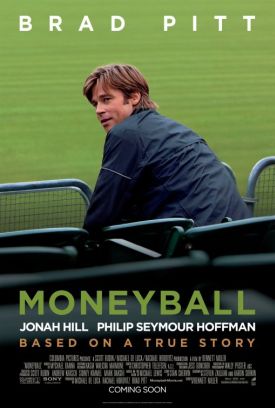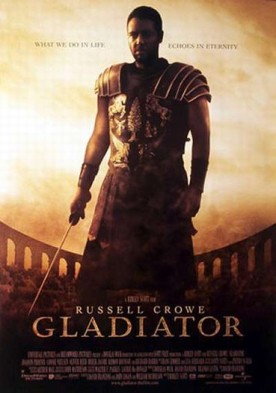Moneyball
Manohla Dargis, opens her New York Times review of Bennett Miller’s Moneyball by calling it “a movie about baseball in the digital age.” The word “digital” can mean pertaining to fingers, numbers or electronic devices that operate by means of computer code (that is, the numbers 0 and 1), and it is usually the last of these that is intended when the adjective is used to modify the word “age.” As computers do not figure particularly prominently in the movie, however, Ms Dargis appears to mean something a bit more vague by the term, something like “the world we now live in which is completely different from that of the pre-digital age.” If so, she shows herself to be as susceptible to utopian romance as the movie’s makers (including top scribe Aaron Sorkin) and its hero, Billy Beane (Brad Pitt), who at one point in the film proclaims it to be his ambition to transform the game of baseball — not, as it happens, with computers necessarily, since the calculations behind the magic of putting together a winning ball club can be done with calculator, abacus or pencil and paper, but with the analytical powers of the human mind.
You know those old-fashioned baseball movies — or almost any other old-fashioned movies — where the grizzled old-timer shows up the young hot-shot who thinks he knows everything? Well, now the young hot-shot who thinks he knows everything does know everything, and thus he obligingly shows up and humiliates the grizzled old-timer with his outmoded information systems. The superior think-power of Moneyball was supplied to Michael Lewis, the author of the book of the same title on which the film is based, by a self-taught statistician called Bill James who, at the time the book came out eight years ago, looked as if he really might be revolutionizing the game. Most people think it hasn’t quite panned out like that, but the dream dies hard. Ms Dargis writes that “Mr. Miller holds onto the romance of baseball that Mr. James and others helped strip away,” but this is a mistake. Neither Mr Miller nor Mr James are stripping away the romance of baseball. They are substituting for it the romance of the intellect.
No baseball player in this movie comes across as a hero, but Billy and his fat, nerdy sidekick Peter Brand (Jonah Hill) do. And they do so by putting Mr James’s theories to work on behalf of the Oakland Athletics — or “A’s” as they now insist on being called — during the 2002 season. Even our sporting heroes are no longer the guys on the field, who mostly appear here as oafs and knuckleheads, even without any allusion on the part of the film-makers to the doping that was apparently rife at the time in the A’s locker room, as in so many others. No, it’s the guys who reduced — or almost reduced or seemed for a time to have reduced — baseball to a science and players to automatons by their sheer intellectual candlepower. They’re the heroes, and it’s because they can be represented, however fleetingly, as having at last discovered, at least in one area of human endeavor, the Golden Fleece, the El Dorado, the Prester John of our time: namely that utopian system which, in the words of T.S. Eliot, is so perfect that no one will have to be good.
Of course, the players brought on board by Messrs. Beane and Brand are good, but they are good, as it were, by necessity. So far as the movie is concerned, at least, there is no virtue to them in their goodness because it is all there already in their numerical curricula vitae as compiled by Peter Brand. And numbers, as we all know, don’t lie. In place of the old-fashioned kind of goodness, or greatness, that we admired in the ballplayers of old, we now have something calling itself fairness, which has something of the same resonance here that it has for President Obama, for whom it means equality. Mr Lewis’s Moneyball‘s subtitle was “The Art of Winning an Unfair Game,” and the ghost of this idea of fairness haunts the movie version as well. What he meant, of course, was not that the game itself was unfair but that it was unfair (in his view) for there to be rich teams and poor teams — like the New York Yankees, who could afford to buy up all the best players and so win year after year, and the lowly A’s who might develop great players but would then routinely lose them to richer teams as soon as they became free agents.
The movie begins with the departure of Jason Giambi, Johnny Damon and Jason Isringhausen from the A’s to richer teams at the end of the 2001 season and implies that it was Mr Beane’s replacement of them with unregarded players identified as stealth stars by the fictional Mr Brand’s ingenious statistical methods which was responsible for their success in 2002 — when they set an American league record by winning 20 games in a row — and subsequent seasons. There is no mention of the contribution to this team of star pitchers Tim Hudson, Mark Mulder and Barry Zito, all of whom were in place before the Moneyball era. That the team has not been so successful — in fact has not had a winning season — since 2006 is also unmentioned, though this is thought by some to be because now everybody in the league is playing Moneyball.
But the movie doesn’t look so far ahead. Instead, it ends with Mr Beane’s turning down an offer to be general manager of the Boston Red Sox, a rich team, which nevertheless went on to win two World Series championships supposedly using his methods. The suggestion is that he is somehow sticking to his principle of “fairness” — or, rather, his discovery (as he supposes) of an ingenious method of compensating for unfairness — by turning down the sort of offer that his top players’ inability to turn down was responsible for the invention in the first place. Whether or not this is true to the facts of Mr Beane’s career, the point is to add power to the movie’s own lineup by idealizing the utopian quest for fairness.
In real life, as we ought to know by now, this ideal of fairness is a will-o’the’wisp, and neither baseball nor anything else is capable of living up to it. Neither luck nor ability will ever be equally distributed, but somehow we continue to enjoy the contests of unequals — in part, perhaps, just because they are unequal. At more than one point in the movie, someone says semi-ironically “how can you not be romantic about baseball” and there is a similar attempt to draw back just a bit when a representative of the old school is allowed to put forward the view that you don’t make a winning team “with a bunch of statistical gimmicks; nobody reinvents this game” — as, indeed, the world of baseball outside the movies would seem to confirm. But the utopian quest for fairness, though as doomed as the A’s championship hopes appear to be, likewise gains romance and emotional power for that very reason. The movie could be compared to Tom Stoppard’s trilogy of plays called The Coast of Utopia, as both treat their egghead utopian projectors with infinite sympathy as romantic heroes of their already-lost causes.
I once wrote a book (Media Madness: The Corruption of Our Political Culture) in which I attempted a very brief catalogue of examples of that favorite media trope (you may recognize it) that goes: “Everything you know about x is wrong.” It ought to be unnecessary to add that the statement is never even remotely true except of people who don’t know anything at all about x, but it apparently continues to rope in the suckers as it continues to be a media favorite. The promise of access to privileged information, even about quite trivial things — “Everything you thought you knew about grilling is wrong,” I seem to remember one of them went — must be nearly as irresistible as the promise of winning the lottery. Or the World Series. The subtitle of Michael Lewis’s book ought not to have been “The Art of Winning an Unfair Game”, but “Everything you know about interpreting baseball statistics is wrong.” Mr Lewis, inspired by Bill James, looked at the game like a journalist in quest of a scoop at least as much as he did like a baseball general manager in quest of a winning season. The same thing is true of the movie, which is to that extent a disappointment.
Discover more from James Bowman
Subscribe to get the latest posts to your email.







